人教版高中英语必修三 Unit2 Healthy Eating Grammar 课件 (共88张PPT)
文档属性
| 名称 | 人教版高中英语必修三 Unit2 Healthy Eating Grammar 课件 (共88张PPT) |
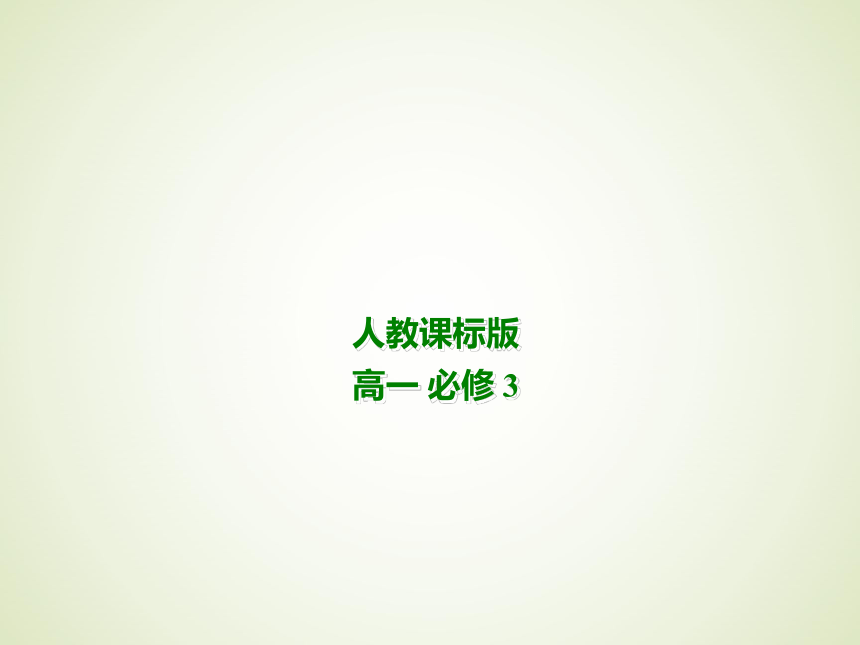
|
|
| 格式 | zip | ||
| 文件大小 | 447.1KB | ||
| 资源类型 | 教案 | ||
| 版本资源 | 人教版(新课程标准) | ||
| 科目 | 英语 | ||
| 更新时间 | 2019-03-18 00:00:00 | ||
图片预览

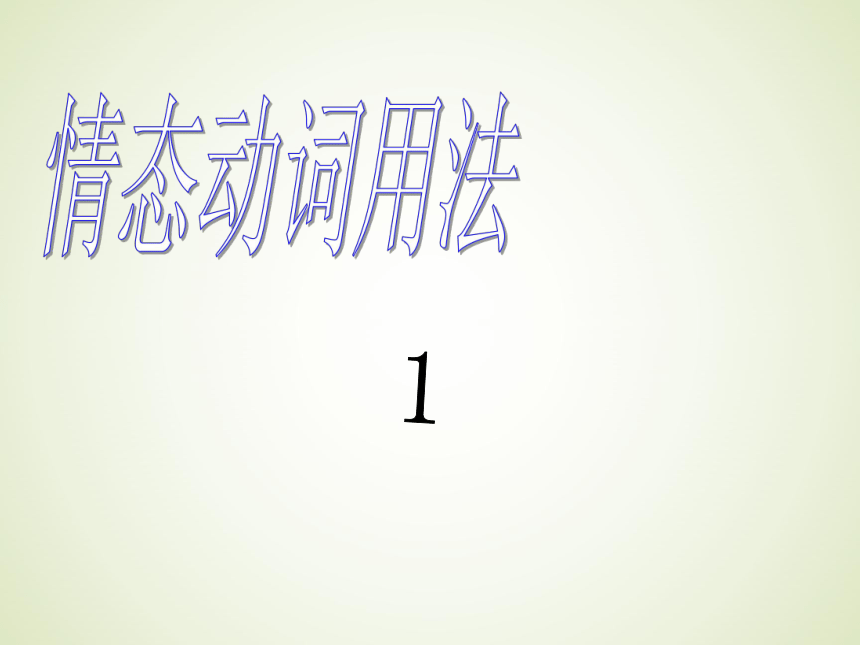
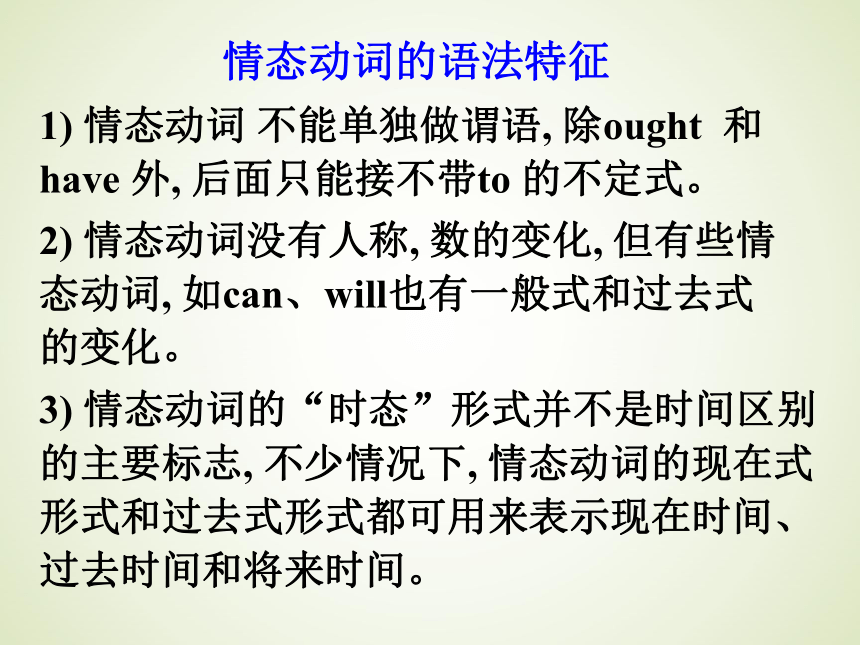
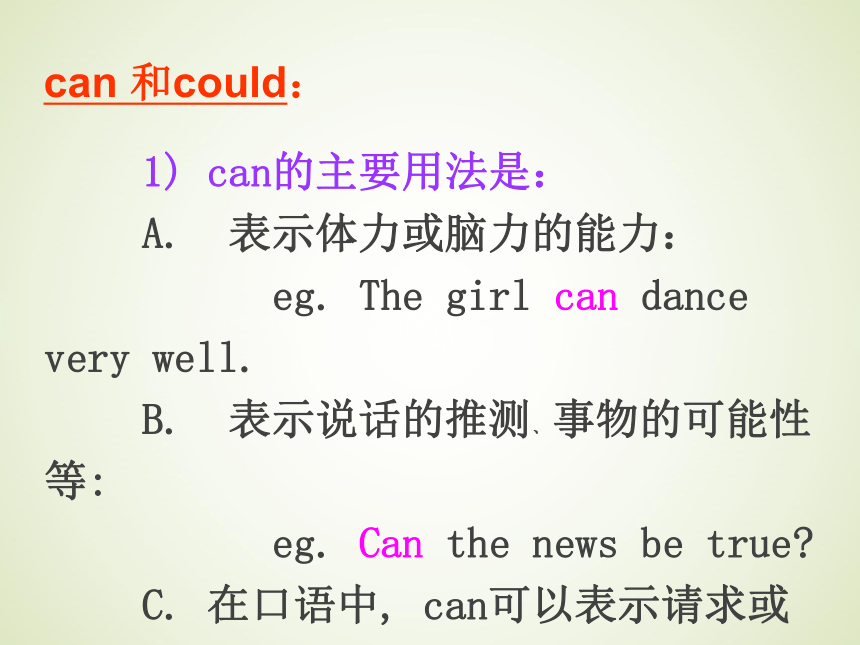
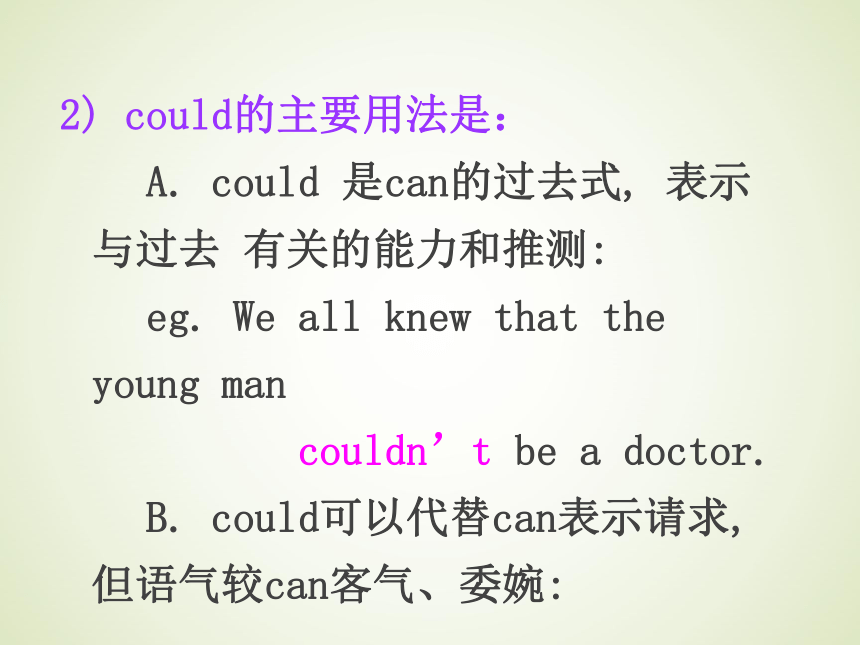
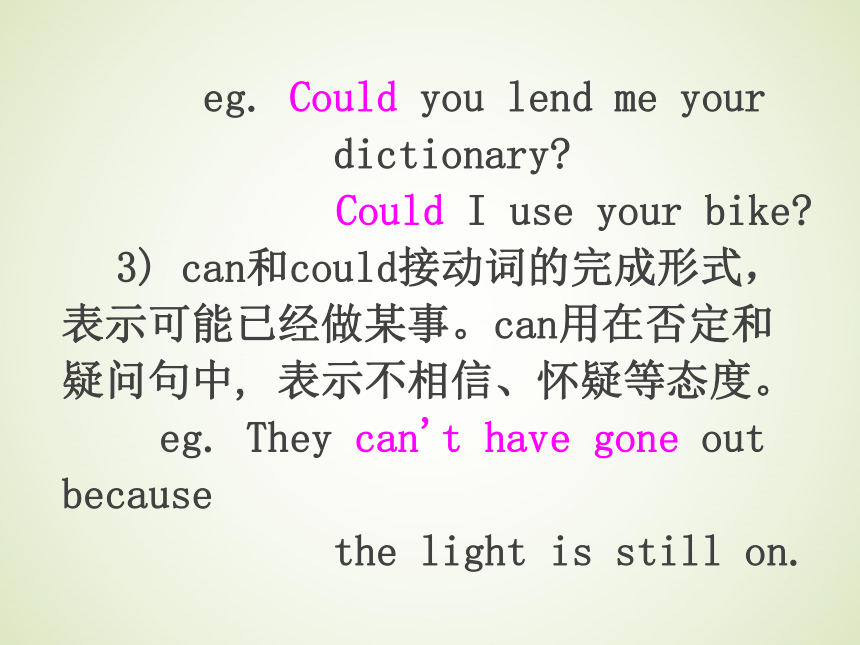
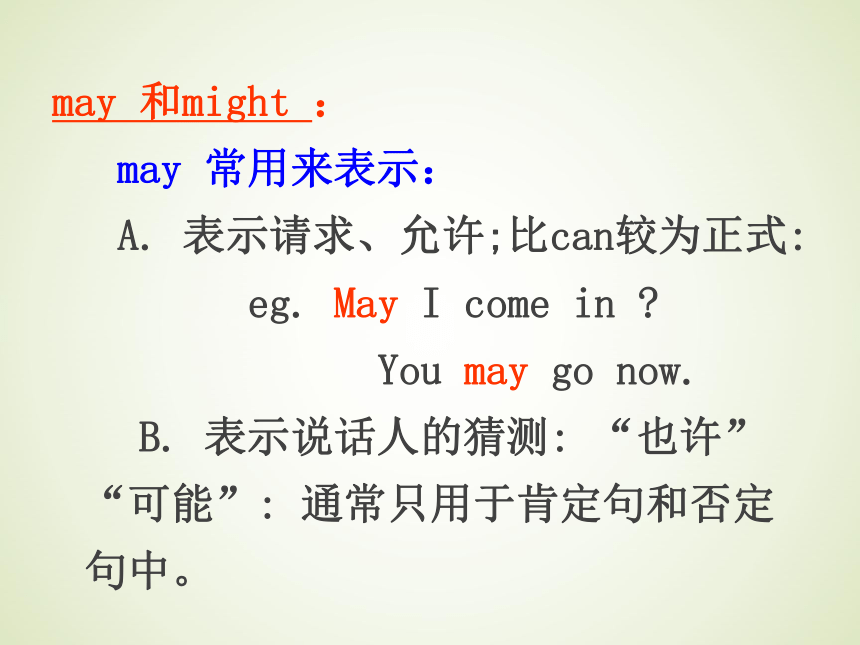
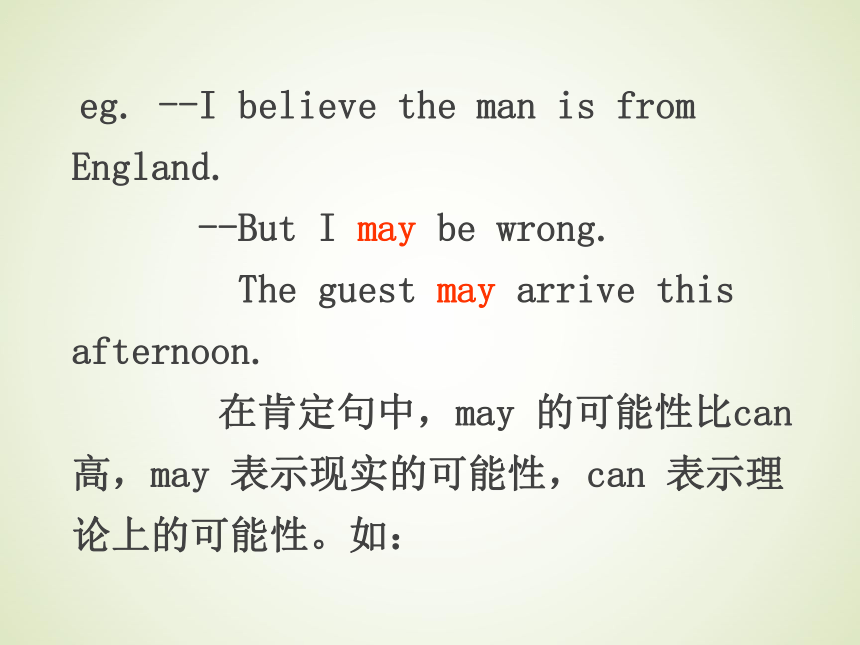
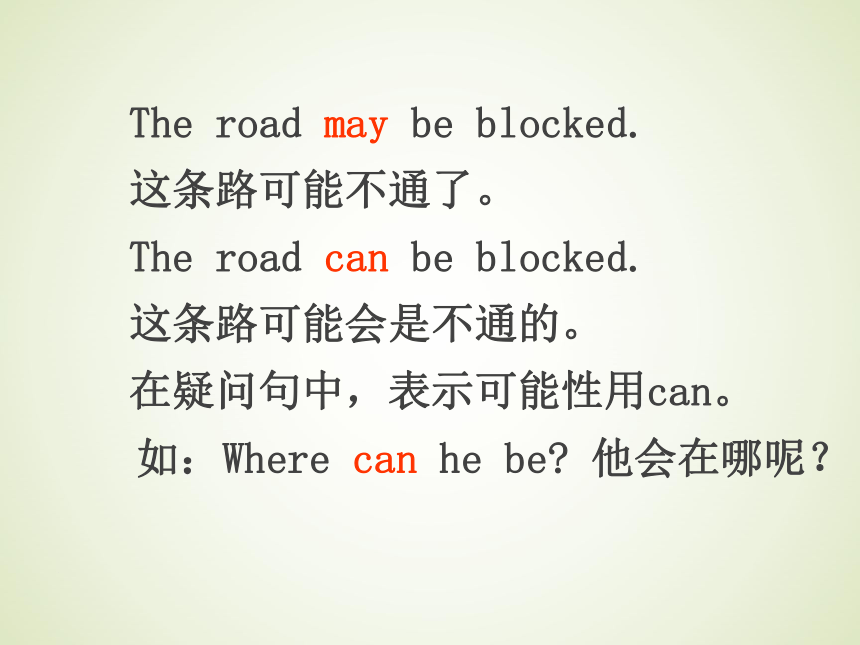
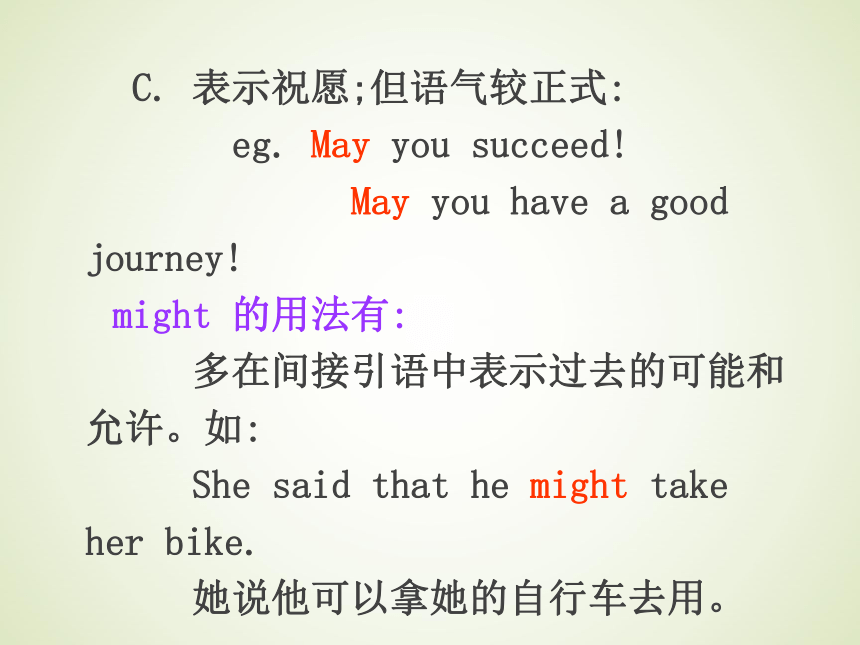
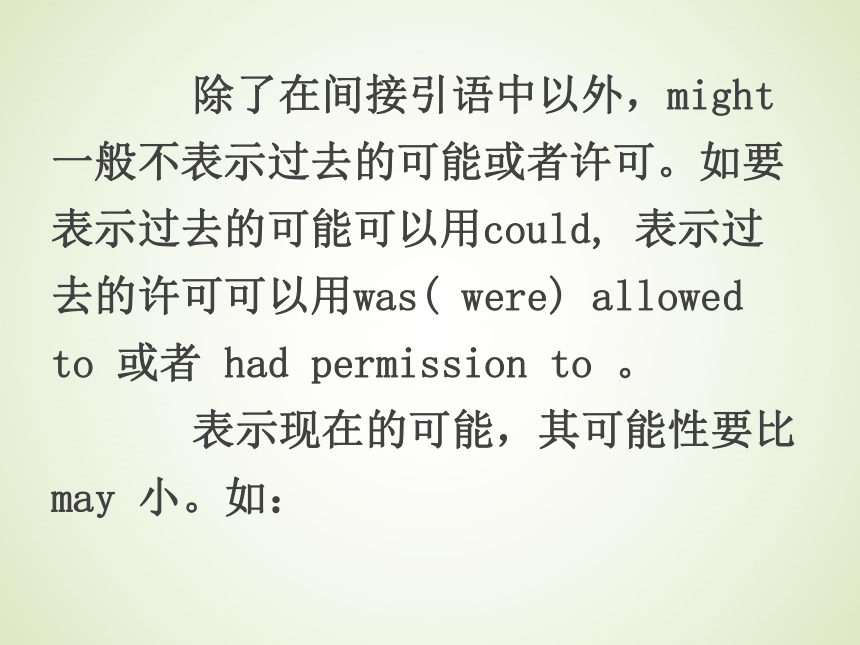
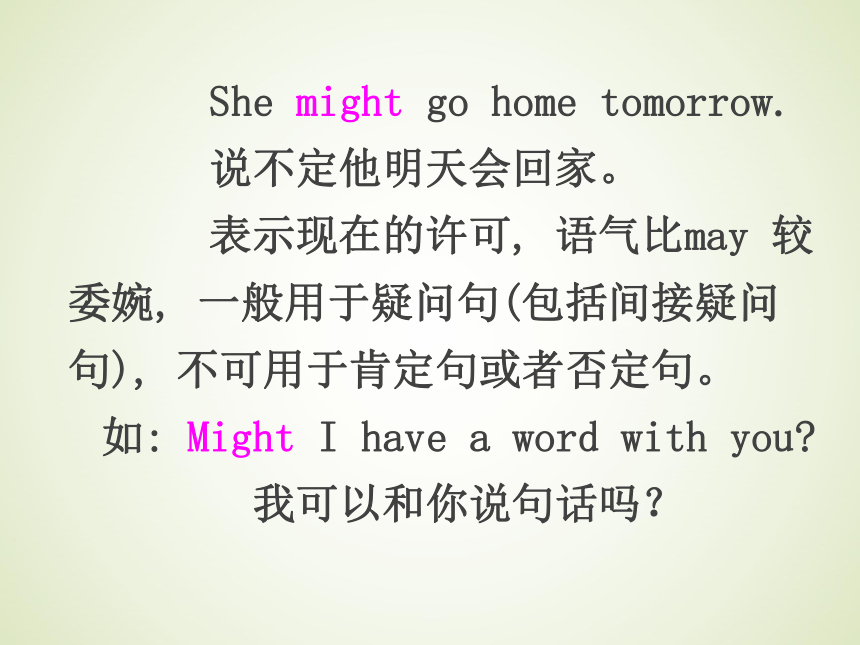
文档简介
课件88张PPT。人教课标版
高一 必修 3情态动词用法1情态动词的语法特征1) 情态动词?不能单独做谓语, 除ought ?和have?外, 后面只能接不带to?的不定式。 2) 情态动词没有人称, 数的变化, 但有些情态动词, 如can、will也有一般式和过去式的变化。3)?情态动词的“时态”形式并不是时间区别的主要标志, 不少情况下, 情态动词的现在式形式和过去式形式都可用来表示现在时间、过去时间和将来时间。 1) can的主要用法是:
? A.? 表示体力或脑力的能力:
? eg. The girl can dance very well.
B.? 表示说话的推测﹑事物的可能性等:
eg. Can the news be true?
C. 在口语中, can可以表示请求或允许:
eg. Can I sit here? can 和could:2) could的主要用法是:
A. could 是can的过去式, 表示与过去 有关的能力和推测:
eg. We all knew that the young man
couldn’t be a doctor.
B. could可以代替can表示请求, 但语气较can客气、委婉: eg. Could you lend me your
dictionary?
Could I use your bike?
3) can和could接动词的完成形式,表示可能已经做某事。can用在否定和疑问句中, 表示不相信、怀疑等态度。
eg. They can't have gone out because
the light is still on.may 和might :
may 常用来表示:
?A. 表示请求、允许;比can较为正式:
?? eg. May I come in ?
You may go now.
B. 表示说话人的猜测: “也许” “可能”: 通常只用于肯定句和否定句中。 eg. --I believe the man is from England.
--But I may be wrong.
The guest may arrive this afternoon.
在肯定句中,may 的可能性比can 高,may 表示现实的可能性,can 表示理论上的可能性。如: The road may be blocked.
这条路可能不通了。
The road can be blocked.
这条路可能会是不通的。
在疑问句中,表示可能性用can。
如:Where can he be? 他会在哪呢? C. 表示祝愿;但语气较正式:
eg. May you succeed!
May you have a good journey!
might 的用法有:
多在间接引语中表示过去的可能和允许。如:
She said that he might take her bike.
她说他可以拿她的自行车去用。 除了在间接引语中以外,might 一般不表示过去的可能或者许可。如要表示过去的可能可以用could, 表示过去的许可可以用was( were) allowed to 或者 had permission to 。
表示现在的可能,其可能性要比 may 小。如: She might go home tomorrow.
说不定他明天会回家。
表示现在的许可, 语气比may 较委婉, 一般用于疑问句(包括间接疑问句), 不可用于肯定句或者否定句。
如: Might I have a word with you?
我可以和你说句话吗?will和would: 1. will是助动词或是情态动词?
will用于构成将来时是助动词。用于表示“意志”“决心”“请求”是情态动词。would亦同理。
eg. I will tell you something
important.
我要告诉你一些重要的事。
(助动词)? Will you tell her that I'm here?
请您告诉她说我在这儿,好吗?
(情态动词) ?
2. 在疑问句中用于第二人称,提出请求或询问。
eg: If you want help - let me know,
will you?
如果你需要帮助, 让我知道, 好吗?
Will you type this, please?
请打印这个, 好吗? ?
Won't you sit down?
请坐下, 好吗?
3. would比will客气委婉。
eg: Would you help us, please?
请您帮助我们,好吗?(表请求)I’d go there with you.
我要和你一块到那儿去。?
Teacher wouldn’t allow it.
老师不会允许这件事。(表意愿)(表许可)shall和should: 1. shall用于构成将来时是助动词。
shall用于征求对方的意见,表示 “决心” 是情态动词。
eg: Perhaps I shall pay a visit to
England this winter.
可能今年冬天我会去英国观光。
(构成一般将来时, 助动词) Shall we go by train, Mom?
妈妈,我们乘火车去好吗?
(用于征求对方的意见,情态动词)
I shall go at once.
我必须立即去。
(表 “决心”,情态动词)
2. should表示义务、建议、劝告,意为 “应该”。 “should+ have+过去分词”
表示本应该在过去做但没有做。
eg: You should keep your promise.
你应该遵守诺言。
She should have passed the exam.
她应该通过考试的。must和 have?to1.must用于一般问句中,肯定回答用must否定式用?needn’t或don’t have to,做?“不必”,mustn’t表示“禁止,不允许” ?— Must?I?finish?all?assignments?at?a?time? ??—Yes, you must.
No,?you?needn't. I don’t like this TV set. We must buy a new one. There was no more bus. They had to walk home.2.表示“必须”这个意思时,must?和have?to?稍有区别。must着重说明主观看法,have?to?强调客观需要。另外,have?to?能用于更多时态。 ?You?must?be?the?new?teacher. ?
He?must?be?joking. There?is?nobody?here.?They?must?have?all gone?home. 3.must表示对某人某事的猜测, 作“准是”, “一定” , 一般用于肯定句中。对过去发生的事情作肯定判断用must have done He must come and worry her with question, just when she was busy cooking the dinner. Of course,after I gave her my advice,she must go and do the opposite.4. must表示“偏要, 硬要”, 指做令人不快的事情 2. A: ______ Xiao Feng find the origin of Easter from that book?
B: No, he _____________. 1. A: ______ you like to go to a special event with us on Saturday?
B: Yes, I _____________________ _________.Would’d like to go with you on SaturdayCouldcouldn’t find itExercise 3. A: _____ I go with my friend to the harvest festival?
B: Yes, you _________________ ________. 4. A: If I want to be a doctor _______ I study science?
B: Yes, you __________________. should study scienceMay may go ( with your shouldfriends )5. A: He is very handsome. ____ he play the role of the prince?
B: No, he _______________________ ______. can’t play the role of theCanprince 6. A: The neighbour’ s children are older this year. _______________ they stop playing tricks at Halloween?
B: Perhaps, they __________ ________________________.
__________________________
____________.Mightor Shouldmight stopor should stop playing tricksplaying tricks at Halloweenat Halloween ----____ I go out to play, mum?
----No, you___. You should do your
homework first.
A. Might; wouldn’t
B. May; had better not
C. Must; mustn’t
D. Need; mustn’tB练习坊I. Choose the correct answer.2. ---Where is Emma?
---I can’t say for sure where she is,
but she___ be out shopping.
A. can
B. should
C. must
D. mayD3. The room is in a terrible mess; it
____ cleaned.
A. can’t have been
B. couldn’t be
C. may have been
D. would be
A4. How ____ you say that you really
understand the whole story if you
have covered only part of the article?
A. can
B. must
C. need
D. mayA5. There ____ be any difficulty about
passing the road test since you have
practised a lot in the driving school.
A. mustn’t
B. shan’t
C. shouldn’t
D. needn’t
C6.---There were already five people in the car but they managed to take me as well.
---It ____a comfortable journey. ( )
A. can't be B. mustn't have been
C. shouldn't be D. couldn't have beenD7.The fire spread through the hotel very quickly but everyone ___ get out. ( )
A. had to B. would
C. could D. was able toD8. Peter ___ come with us tonight, but he isn’t very sure.
must B. can C. may D. willC9. --- Could I call you by your first name? --- Yes, you____.
A. will B. could C. may D. mightC10. Sorry, I ’m late. I ___ have turned off the alarm clock and gone back to sleep again.
might B. should C. can D. willA11.--Excuse me, but I want to use your computer to type a report.
--You ____ have my computer if you don’t take care of it.
shan’t B. might not
C. needn’t D. shouldn’tA12. ---When can I come for the photos? I need them tomorrow afternoon.
---They _____be ready by 12 : 00.
A. can B. should C. might D. needB13. With so much work on hand, you __ to see the game last night.
A. mustn’t go B. could have gone
C. shouldn’t go D. shouldn’t have goneD14.Johnny, you ___ play with the knife, you ____ hurt yourself.
A. won't ; can't B. mustn't ; may
C. shouldn't ; must D. can't ; wouldn'tB15.There is no light in the dormitory. They must have gone to the lecture, _____?
A. didn’t they B. don’t they
C. mustn’t they D. haven’t theyD16. I missed the bus, so I __ go home on foot.
A. must B. may C. can D. had toD1. “____ you walk without my help?” Father asked his little son.
2. He ___________ be married, but I’m not sure.
3. What you said _____ be true, but I just couldn’t believe you. Canmay / mightmightII. 用括号中所给的情态动词(can / could, may / might, will / would, shall / should, must) 填空。4. Mary’s score on the test is the highest in her class. She _____ have studied very hard.
5. ______ you like to give me a hand when I go upstairs?
6. _____ we go to the cinema?mustWouldShall7. We ___ help him to solve the problem if he asks us to.
8. He hurt his foot and _____ not play football.
9. As students, we ______ study hard.willcouldshould 2Find the sentences containing modal verbs in the reading passage.Then usually by lunchtime they would all be sold.
What could have happened?
Nothing could be better…”
Something terrible must have happened if …He could not believe his eyes.
Perhaps he should go to the library and find out.
He had better do some research!
Even though her customers might get thin after eating Yong Hui’s food…
They would become tired very quickly.Modal verbsa. should, ought to都可表示“应该”。ought to用于表示按道理应当,常指客观的义务或责任,大多数情况下可用should代替,但比should语气重。I should help her because she is in trouble.
You ought to take care of the baby.b. 表示劝告、建议或命令时,should和ought to可通用,但在疑问句中常用should。ought to的否定式为oughtn’t to或ought not to。You should / ought to go to class right away.
Should I open the window?
What should we do next?c. should, ought to都可表示推测。He ought to / should be home by now.
This is where the oil ought to / should be. should 和ought to 后面跟动词不定式的完成式, 其肯定句表示“过去应该做而未做”, 其否定句则表示 “过去不该做但做了”。
You should/ought to have made the decision a week ago.
I shouldn’t have made such a foolish mistake.
多数情况下,ought to可与should互换使用。ought to的反意疑问句用shouldn’t替代。注意You ought to have helped him with his English, ________?
A. won’t you
B. ought not you
C. shouldn’t you
D. wouldn’t you 2. must和have to
must的用法?
1) 表示主观的义务和必要,?主要用于肯定句和疑问句,?意思为?“必须……,得……,要……”;由must引起的疑问句,肯定回答要用must或have?to,?否定回答要用needn’t或don’t?have?to,? 意思是“不必” ; must的否定形式mustn’t表示禁止,意思是“不能,不许”。如:?
— Must?I?finish?the?task?right?now?? 我现在必须完成这个工作吗? —Yes,?you?must.?/?Yes,?you?have?to.?
是的。?
(—No, you needn’t. / No, you don’t have to. 不,不必。)
You mustn’t come here without permission.
未经允许,你不能来这儿。 have?to?的用法? 1) must表示一种主观的需要,而have?to表示一种客观的需要,意思是“不得不”。?如:?
I have to attend an important meeting this afternoon.
今天下午我不得不参加一个重要的会议。 Mother is out, so I have to look after the shop.
妈妈不在家,因此我不得不照看商店。?
2) have?to?的否定形式是don’t have to, 相当于needn’t。如:
They don’t have to buy a computer at present. 他们目前没有必要买电脑。?【考例】The boss has given everyone a special holiday, so we ____ go to work tomorrow. (上海 2007春)
A. can’t B. mustn’t
C. needn’t D. shouldn’t
【点拨】考查情态动词。根据题意, 可知这里表示“没有必要”, 故只能选C项。【考例】─What do you think we can do for our aged parents?
─You ____ do anything except to be with them and be yourself. (重庆 2007)
A. don’t have to B. oughtn’t to
C. mustn’t D. can’t
【点拨】根据题意“除了和他们呆在一起做你自己外, 没有必要做任何事情。”可知这里选择don’t have to表示“不必”。故选A项。3. must和need
need作情态动词时, 只能用于疑问句和否定句。构成否定句和疑问句时不借助于助动词do。
—Need I finish the work today?
—Yes, you must. / No, you needn’t.b. must的肯定形式表示“必须”,否定式
表示“禁止、严禁”。
You must come here.
You mustn’t take the book away from
the library. 用下列图片造句。做适当的运动 You should do some sports. 慢慢地进食,并有助消化。 You ought to eat slowly and it’s good for digestion. You should help to set the dinner table. You should keep your room clean.We must listen to the teacher carefully.We mustn’t eat in class.You ought to hand on the homework on time.You shouldn’t be late for school.We should ask question actively.We shouldn’t make noise in class.Make sentences 1. 你每天最少要练习一小时口语。
You must practise speaking English at least an hour a day.
2. 我每天不得不练习一小时口语!
I have to practise speaking English an hour a day! 3. 你应该每天练习不止一小时。
You ought to/should practice
English for more than an hour.
4. 你应该读一下这个。它写得很好。
You ought to/should read this.
It’s very good.
5. 你必须读这个。写得精彩极了!
You must read this.It's marvelous! Please choose a proper phrase and according to the situations complete the sentences by using should (not) or ought (not) to.
1. Lisa needs a change. She _______________________________.
2. My salary is very low. You ______________________. should/ought to take a few days offshould look for a new job 3. Nick always has difficulty getting up. He _______________________
____________.
4. What a beautiful view! You __________________.
5. Billy’s room isn’t very interesting. He ___________________________
___________.ought not to /shouldn’t go to bed so lateshould take a photoshouldn’t/ ought not to use hercar so muchChoose suitable modal verbs below to complete the following dialogues.ought/oughtn’t to should/ shouldn’t
mustn’t needn’t (don’t) have to will can/ can’t1 Sam: How can I grow thinner, Mum?
Mum: Well, you _______ eat food with
plenty of fibre that helps you
digest better. And you _____ stop
drinking cola or eating sweet food.have to should Sam: Does it mean I _________ eat my
favourite fried chicken any more?
Mum: Not exactly, if you love fried
chicken, you ______ give it up.
Just eat it less often. You
______________________________
worry too much: a little fried
chicken ____ do you good! shouldn’t needn’tdon’t have to/ needn’t/ shouldn’t will2 Doctor: You are sick because you’ve
eaten poisonous mushrooms.
Where did you get them?
Lucy: I picked them in the forest. I know
we _______ eat fresh vegetables.
Doctor: Oh, but you _______ eat them
until you’re sure they are not
poisonous.
Lucy: Thank you, doctor. I’ll be more
careful next time.have tomustn’t 3 Charles: I wish I could see things
clearly in the dark.
Tom: Eating carrots _______ help
you see better. You _______ eat
some every day.ought to should1. _______ to discuss something with
someone so that you can make a
decision together
2. _______ to change food that you have
just eaten into substances that your
body can use 练习坊I. 根据下列英文解释写出所缺的单词。consultdigest3. ______ a long pointed orange
vegetable that grows under the
ground
4. __________ containing poison or
producing poison carrotpoisonous1. For a long time, I’ve built my business with people who are ________ (精力旺盛的), creative, and happy about their work.
2. This rich food doesn’t _____ (消化) easily.energetic digest根据下列各句句意及所给单词的汉语提示, 写出各单词的正确形式。3. The dish of boiled beef and _____ (胡萝卜) tastes good.
4. An increasing number of people are _________ (请教) their accountants about the tax laws.
5. This medicine is _________ (有毒) if taken in large quantities.carrotconsultingpoisonousmust; oughtn’t to; don’t have to; couldn’t;
mustn’t; needn’t; can’t; have toII. 用所给的情态动词填空。1. You _______________________ go on
working because you look so tired now.
2. The weather turned out to be fine
yesterday. I _______ have had the
trouble to carry my umbrella with me. oughtn’t to / don’t have to needn’tmust; oughtn’t to; don’t have to; couldn’t;
mustn’t; needn’t; can’t; have to3. If you earn more than £5,000, you
_______ pay tax.
4. You _______ play now!You shall finish
your homework first!
5. I know things are hard with you, but
you _____________ try to get over the difficulties.have tomustn’tmust / have tomust; oughtn’t to; don’t have to; couldn’t;
mustn’t; needn’t; can’t; have to6. I didn’t see her at the meeting this
morning; she _____________ have
spoken at the meeting. couldn’t / can’t1. I thought you __ like something to read, so I have brought you some books.
A. may B. might C. would D. must
2. Where is my pen? I ____ it.
A. might lose B. would have lost
C. should have lost D. must have lost高考链接3. I didn’t hear the phone. I __ asleep.
A. must be B. must have been
C. should be D. should have been4. --Is John coming by train?
--He should, but he __ not. He likes driving his car. (2002高考题)
A. must B. can C. need D. may
5. It has been announced that candidates (候选人) ____ remain in their seats until all the papers have been collected. (2002上海高考题)
A. can B. will C. may D. shall6. --I heard they went skiing in the mountains last winter.
--It ____ true because there was little snow there. (2002北京高考题)
A. may not be B. won’t be
C. couldn’t be D. mustn’t be7. ---There were already five people in the car, but they managed to take me as well.
---It ___ a comfortable journey.
A. can’t be B. shouldn’t be
C. mustn’t have been D. couldn’t have been
8. It’s nearly seven o’clock . Jack __ be here at any moment.
A. must B. need C. should D. couldHomework1. Preview the reading (2) and reading task on Page 52. See how the story ended.
2. Find some information about healthy eating on the Internet.
高一 必修 3情态动词用法1情态动词的语法特征1) 情态动词?不能单独做谓语, 除ought ?和have?外, 后面只能接不带to?的不定式。 2) 情态动词没有人称, 数的变化, 但有些情态动词, 如can、will也有一般式和过去式的变化。3)?情态动词的“时态”形式并不是时间区别的主要标志, 不少情况下, 情态动词的现在式形式和过去式形式都可用来表示现在时间、过去时间和将来时间。 1) can的主要用法是:
? A.? 表示体力或脑力的能力:
? eg. The girl can dance very well.
B.? 表示说话的推测﹑事物的可能性等:
eg. Can the news be true?
C. 在口语中, can可以表示请求或允许:
eg. Can I sit here? can 和could:2) could的主要用法是:
A. could 是can的过去式, 表示与过去 有关的能力和推测:
eg. We all knew that the young man
couldn’t be a doctor.
B. could可以代替can表示请求, 但语气较can客气、委婉: eg. Could you lend me your
dictionary?
Could I use your bike?
3) can和could接动词的完成形式,表示可能已经做某事。can用在否定和疑问句中, 表示不相信、怀疑等态度。
eg. They can't have gone out because
the light is still on.may 和might :
may 常用来表示:
?A. 表示请求、允许;比can较为正式:
?? eg. May I come in ?
You may go now.
B. 表示说话人的猜测: “也许” “可能”: 通常只用于肯定句和否定句中。 eg. --I believe the man is from England.
--But I may be wrong.
The guest may arrive this afternoon.
在肯定句中,may 的可能性比can 高,may 表示现实的可能性,can 表示理论上的可能性。如: The road may be blocked.
这条路可能不通了。
The road can be blocked.
这条路可能会是不通的。
在疑问句中,表示可能性用can。
如:Where can he be? 他会在哪呢? C. 表示祝愿;但语气较正式:
eg. May you succeed!
May you have a good journey!
might 的用法有:
多在间接引语中表示过去的可能和允许。如:
She said that he might take her bike.
她说他可以拿她的自行车去用。 除了在间接引语中以外,might 一般不表示过去的可能或者许可。如要表示过去的可能可以用could, 表示过去的许可可以用was( were) allowed to 或者 had permission to 。
表示现在的可能,其可能性要比 may 小。如: She might go home tomorrow.
说不定他明天会回家。
表示现在的许可, 语气比may 较委婉, 一般用于疑问句(包括间接疑问句), 不可用于肯定句或者否定句。
如: Might I have a word with you?
我可以和你说句话吗?will和would: 1. will是助动词或是情态动词?
will用于构成将来时是助动词。用于表示“意志”“决心”“请求”是情态动词。would亦同理。
eg. I will tell you something
important.
我要告诉你一些重要的事。
(助动词)? Will you tell her that I'm here?
请您告诉她说我在这儿,好吗?
(情态动词) ?
2. 在疑问句中用于第二人称,提出请求或询问。
eg: If you want help - let me know,
will you?
如果你需要帮助, 让我知道, 好吗?
Will you type this, please?
请打印这个, 好吗? ?
Won't you sit down?
请坐下, 好吗?
3. would比will客气委婉。
eg: Would you help us, please?
请您帮助我们,好吗?(表请求)I’d go there with you.
我要和你一块到那儿去。?
Teacher wouldn’t allow it.
老师不会允许这件事。(表意愿)(表许可)shall和should: 1. shall用于构成将来时是助动词。
shall用于征求对方的意见,表示 “决心” 是情态动词。
eg: Perhaps I shall pay a visit to
England this winter.
可能今年冬天我会去英国观光。
(构成一般将来时, 助动词) Shall we go by train, Mom?
妈妈,我们乘火车去好吗?
(用于征求对方的意见,情态动词)
I shall go at once.
我必须立即去。
(表 “决心”,情态动词)
2. should表示义务、建议、劝告,意为 “应该”。 “should+ have+过去分词”
表示本应该在过去做但没有做。
eg: You should keep your promise.
你应该遵守诺言。
She should have passed the exam.
她应该通过考试的。must和 have?to1.must用于一般问句中,肯定回答用must否定式用?needn’t或don’t have to,做?“不必”,mustn’t表示“禁止,不允许” ?— Must?I?finish?all?assignments?at?a?time? ??—Yes, you must.
No,?you?needn't. I don’t like this TV set. We must buy a new one. There was no more bus. They had to walk home.2.表示“必须”这个意思时,must?和have?to?稍有区别。must着重说明主观看法,have?to?强调客观需要。另外,have?to?能用于更多时态。 ?You?must?be?the?new?teacher. ?
He?must?be?joking. There?is?nobody?here.?They?must?have?all gone?home. 3.must表示对某人某事的猜测, 作“准是”, “一定” , 一般用于肯定句中。对过去发生的事情作肯定判断用must have done He must come and worry her with question, just when she was busy cooking the dinner. Of course,after I gave her my advice,she must go and do the opposite.4. must表示“偏要, 硬要”, 指做令人不快的事情 2. A: ______ Xiao Feng find the origin of Easter from that book?
B: No, he _____________. 1. A: ______ you like to go to a special event with us on Saturday?
B: Yes, I _____________________ _________.Would’d like to go with you on SaturdayCouldcouldn’t find itExercise 3. A: _____ I go with my friend to the harvest festival?
B: Yes, you _________________ ________. 4. A: If I want to be a doctor _______ I study science?
B: Yes, you __________________. should study scienceMay may go ( with your shouldfriends )5. A: He is very handsome. ____ he play the role of the prince?
B: No, he _______________________ ______. can’t play the role of theCanprince 6. A: The neighbour’ s children are older this year. _______________ they stop playing tricks at Halloween?
B: Perhaps, they __________ ________________________.
__________________________
____________.Mightor Shouldmight stopor should stop playing tricksplaying tricks at Halloweenat Halloween ----____ I go out to play, mum?
----No, you___. You should do your
homework first.
A. Might; wouldn’t
B. May; had better not
C. Must; mustn’t
D. Need; mustn’tB练习坊I. Choose the correct answer.2. ---Where is Emma?
---I can’t say for sure where she is,
but she___ be out shopping.
A. can
B. should
C. must
D. mayD3. The room is in a terrible mess; it
____ cleaned.
A. can’t have been
B. couldn’t be
C. may have been
D. would be
A4. How ____ you say that you really
understand the whole story if you
have covered only part of the article?
A. can
B. must
C. need
D. mayA5. There ____ be any difficulty about
passing the road test since you have
practised a lot in the driving school.
A. mustn’t
B. shan’t
C. shouldn’t
D. needn’t
C6.---There were already five people in the car but they managed to take me as well.
---It ____a comfortable journey. ( )
A. can't be B. mustn't have been
C. shouldn't be D. couldn't have beenD7.The fire spread through the hotel very quickly but everyone ___ get out. ( )
A. had to B. would
C. could D. was able toD8. Peter ___ come with us tonight, but he isn’t very sure.
must B. can C. may D. willC9. --- Could I call you by your first name? --- Yes, you____.
A. will B. could C. may D. mightC10. Sorry, I ’m late. I ___ have turned off the alarm clock and gone back to sleep again.
might B. should C. can D. willA11.--Excuse me, but I want to use your computer to type a report.
--You ____ have my computer if you don’t take care of it.
shan’t B. might not
C. needn’t D. shouldn’tA12. ---When can I come for the photos? I need them tomorrow afternoon.
---They _____be ready by 12 : 00.
A. can B. should C. might D. needB13. With so much work on hand, you __ to see the game last night.
A. mustn’t go B. could have gone
C. shouldn’t go D. shouldn’t have goneD14.Johnny, you ___ play with the knife, you ____ hurt yourself.
A. won't ; can't B. mustn't ; may
C. shouldn't ; must D. can't ; wouldn'tB15.There is no light in the dormitory. They must have gone to the lecture, _____?
A. didn’t they B. don’t they
C. mustn’t they D. haven’t theyD16. I missed the bus, so I __ go home on foot.
A. must B. may C. can D. had toD1. “____ you walk without my help?” Father asked his little son.
2. He ___________ be married, but I’m not sure.
3. What you said _____ be true, but I just couldn’t believe you. Canmay / mightmightII. 用括号中所给的情态动词(can / could, may / might, will / would, shall / should, must) 填空。4. Mary’s score on the test is the highest in her class. She _____ have studied very hard.
5. ______ you like to give me a hand when I go upstairs?
6. _____ we go to the cinema?mustWouldShall7. We ___ help him to solve the problem if he asks us to.
8. He hurt his foot and _____ not play football.
9. As students, we ______ study hard.willcouldshould 2Find the sentences containing modal verbs in the reading passage.Then usually by lunchtime they would all be sold.
What could have happened?
Nothing could be better…”
Something terrible must have happened if …He could not believe his eyes.
Perhaps he should go to the library and find out.
He had better do some research!
Even though her customers might get thin after eating Yong Hui’s food…
They would become tired very quickly.Modal verbsa. should, ought to都可表示“应该”。ought to用于表示按道理应当,常指客观的义务或责任,大多数情况下可用should代替,但比should语气重。I should help her because she is in trouble.
You ought to take care of the baby.b. 表示劝告、建议或命令时,should和ought to可通用,但在疑问句中常用should。ought to的否定式为oughtn’t to或ought not to。You should / ought to go to class right away.
Should I open the window?
What should we do next?c. should, ought to都可表示推测。He ought to / should be home by now.
This is where the oil ought to / should be. should 和ought to 后面跟动词不定式的完成式, 其肯定句表示“过去应该做而未做”, 其否定句则表示 “过去不该做但做了”。
You should/ought to have made the decision a week ago.
I shouldn’t have made such a foolish mistake.
多数情况下,ought to可与should互换使用。ought to的反意疑问句用shouldn’t替代。注意You ought to have helped him with his English, ________?
A. won’t you
B. ought not you
C. shouldn’t you
D. wouldn’t you 2. must和have to
must的用法?
1) 表示主观的义务和必要,?主要用于肯定句和疑问句,?意思为?“必须……,得……,要……”;由must引起的疑问句,肯定回答要用must或have?to,?否定回答要用needn’t或don’t?have?to,? 意思是“不必” ; must的否定形式mustn’t表示禁止,意思是“不能,不许”。如:?
— Must?I?finish?the?task?right?now?? 我现在必须完成这个工作吗? —Yes,?you?must.?/?Yes,?you?have?to.?
是的。?
(—No, you needn’t. / No, you don’t have to. 不,不必。)
You mustn’t come here without permission.
未经允许,你不能来这儿。 have?to?的用法? 1) must表示一种主观的需要,而have?to表示一种客观的需要,意思是“不得不”。?如:?
I have to attend an important meeting this afternoon.
今天下午我不得不参加一个重要的会议。 Mother is out, so I have to look after the shop.
妈妈不在家,因此我不得不照看商店。?
2) have?to?的否定形式是don’t have to, 相当于needn’t。如:
They don’t have to buy a computer at present. 他们目前没有必要买电脑。?【考例】The boss has given everyone a special holiday, so we ____ go to work tomorrow. (上海 2007春)
A. can’t B. mustn’t
C. needn’t D. shouldn’t
【点拨】考查情态动词。根据题意, 可知这里表示“没有必要”, 故只能选C项。【考例】─What do you think we can do for our aged parents?
─You ____ do anything except to be with them and be yourself. (重庆 2007)
A. don’t have to B. oughtn’t to
C. mustn’t D. can’t
【点拨】根据题意“除了和他们呆在一起做你自己外, 没有必要做任何事情。”可知这里选择don’t have to表示“不必”。故选A项。3. must和need
need作情态动词时, 只能用于疑问句和否定句。构成否定句和疑问句时不借助于助动词do。
—Need I finish the work today?
—Yes, you must. / No, you needn’t.b. must的肯定形式表示“必须”,否定式
表示“禁止、严禁”。
You must come here.
You mustn’t take the book away from
the library. 用下列图片造句。做适当的运动 You should do some sports. 慢慢地进食,并有助消化。 You ought to eat slowly and it’s good for digestion. You should help to set the dinner table. You should keep your room clean.We must listen to the teacher carefully.We mustn’t eat in class.You ought to hand on the homework on time.You shouldn’t be late for school.We should ask question actively.We shouldn’t make noise in class.Make sentences 1. 你每天最少要练习一小时口语。
You must practise speaking English at least an hour a day.
2. 我每天不得不练习一小时口语!
I have to practise speaking English an hour a day! 3. 你应该每天练习不止一小时。
You ought to/should practice
English for more than an hour.
4. 你应该读一下这个。它写得很好。
You ought to/should read this.
It’s very good.
5. 你必须读这个。写得精彩极了!
You must read this.It's marvelous! Please choose a proper phrase and according to the situations complete the sentences by using should (not) or ought (not) to.
1. Lisa needs a change. She _______________________________.
2. My salary is very low. You ______________________. should/ought to take a few days offshould look for a new job 3. Nick always has difficulty getting up. He _______________________
____________.
4. What a beautiful view! You __________________.
5. Billy’s room isn’t very interesting. He ___________________________
___________.ought not to /shouldn’t go to bed so lateshould take a photoshouldn’t/ ought not to use hercar so muchChoose suitable modal verbs below to complete the following dialogues.ought/oughtn’t to should/ shouldn’t
mustn’t needn’t (don’t) have to will can/ can’t1 Sam: How can I grow thinner, Mum?
Mum: Well, you _______ eat food with
plenty of fibre that helps you
digest better. And you _____ stop
drinking cola or eating sweet food.have to should Sam: Does it mean I _________ eat my
favourite fried chicken any more?
Mum: Not exactly, if you love fried
chicken, you ______ give it up.
Just eat it less often. You
______________________________
worry too much: a little fried
chicken ____ do you good! shouldn’t needn’tdon’t have to/ needn’t/ shouldn’t will2 Doctor: You are sick because you’ve
eaten poisonous mushrooms.
Where did you get them?
Lucy: I picked them in the forest. I know
we _______ eat fresh vegetables.
Doctor: Oh, but you _______ eat them
until you’re sure they are not
poisonous.
Lucy: Thank you, doctor. I’ll be more
careful next time.have tomustn’t 3 Charles: I wish I could see things
clearly in the dark.
Tom: Eating carrots _______ help
you see better. You _______ eat
some every day.ought to should1. _______ to discuss something with
someone so that you can make a
decision together
2. _______ to change food that you have
just eaten into substances that your
body can use 练习坊I. 根据下列英文解释写出所缺的单词。consultdigest3. ______ a long pointed orange
vegetable that grows under the
ground
4. __________ containing poison or
producing poison carrotpoisonous1. For a long time, I’ve built my business with people who are ________ (精力旺盛的), creative, and happy about their work.
2. This rich food doesn’t _____ (消化) easily.energetic digest根据下列各句句意及所给单词的汉语提示, 写出各单词的正确形式。3. The dish of boiled beef and _____ (胡萝卜) tastes good.
4. An increasing number of people are _________ (请教) their accountants about the tax laws.
5. This medicine is _________ (有毒) if taken in large quantities.carrotconsultingpoisonousmust; oughtn’t to; don’t have to; couldn’t;
mustn’t; needn’t; can’t; have toII. 用所给的情态动词填空。1. You _______________________ go on
working because you look so tired now.
2. The weather turned out to be fine
yesterday. I _______ have had the
trouble to carry my umbrella with me. oughtn’t to / don’t have to needn’tmust; oughtn’t to; don’t have to; couldn’t;
mustn’t; needn’t; can’t; have to3. If you earn more than £5,000, you
_______ pay tax.
4. You _______ play now!You shall finish
your homework first!
5. I know things are hard with you, but
you _____________ try to get over the difficulties.have tomustn’tmust / have tomust; oughtn’t to; don’t have to; couldn’t;
mustn’t; needn’t; can’t; have to6. I didn’t see her at the meeting this
morning; she _____________ have
spoken at the meeting. couldn’t / can’t1. I thought you __ like something to read, so I have brought you some books.
A. may B. might C. would D. must
2. Where is my pen? I ____ it.
A. might lose B. would have lost
C. should have lost D. must have lost高考链接3. I didn’t hear the phone. I __ asleep.
A. must be B. must have been
C. should be D. should have been4. --Is John coming by train?
--He should, but he __ not. He likes driving his car. (2002高考题)
A. must B. can C. need D. may
5. It has been announced that candidates (候选人) ____ remain in their seats until all the papers have been collected. (2002上海高考题)
A. can B. will C. may D. shall6. --I heard they went skiing in the mountains last winter.
--It ____ true because there was little snow there. (2002北京高考题)
A. may not be B. won’t be
C. couldn’t be D. mustn’t be7. ---There were already five people in the car, but they managed to take me as well.
---It ___ a comfortable journey.
A. can’t be B. shouldn’t be
C. mustn’t have been D. couldn’t have been
8. It’s nearly seven o’clock . Jack __ be here at any moment.
A. must B. need C. should D. couldHomework1. Preview the reading (2) and reading task on Page 52. See how the story ended.
2. Find some information about healthy eating on the Internet.
同课章节目录
